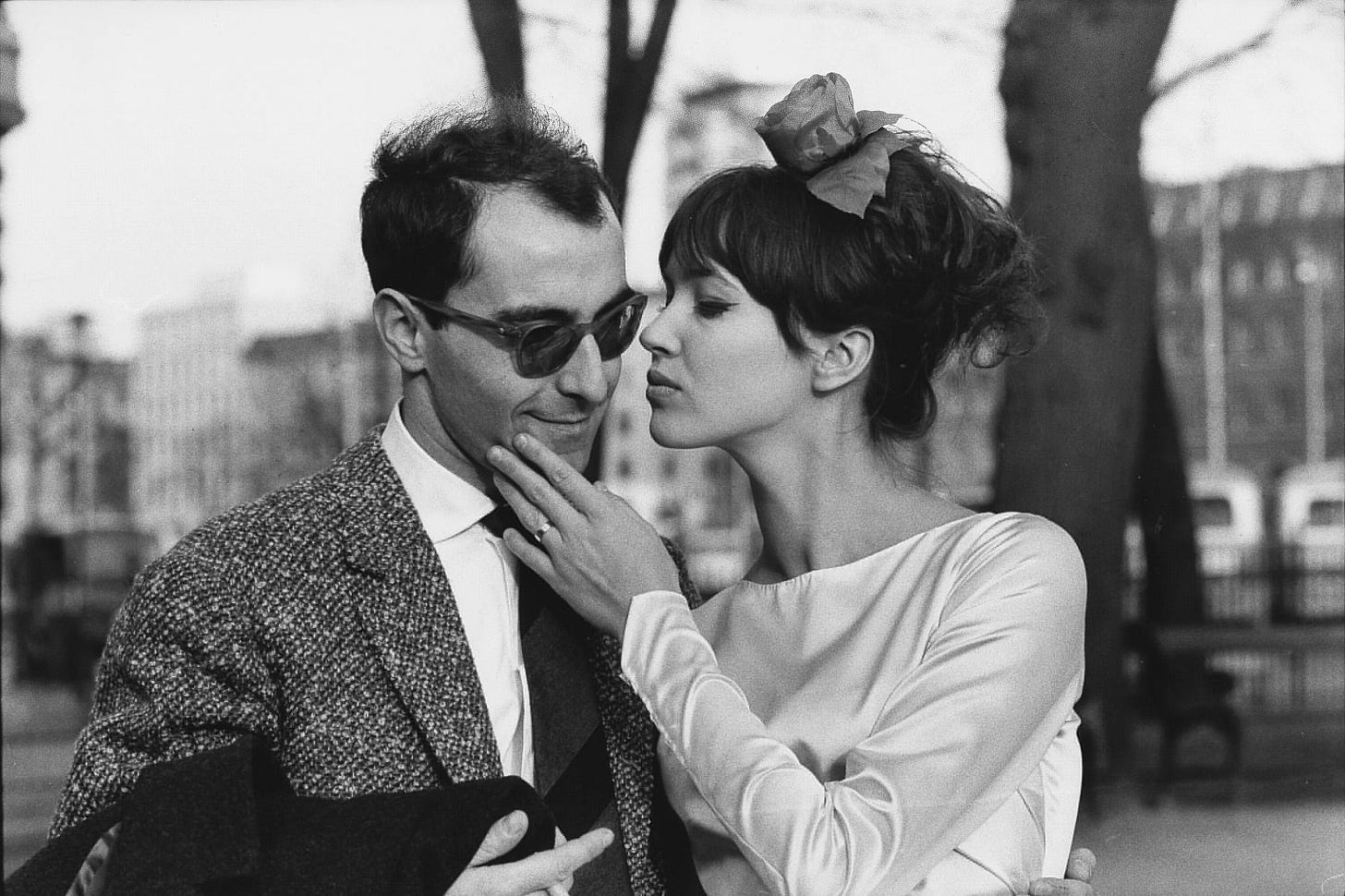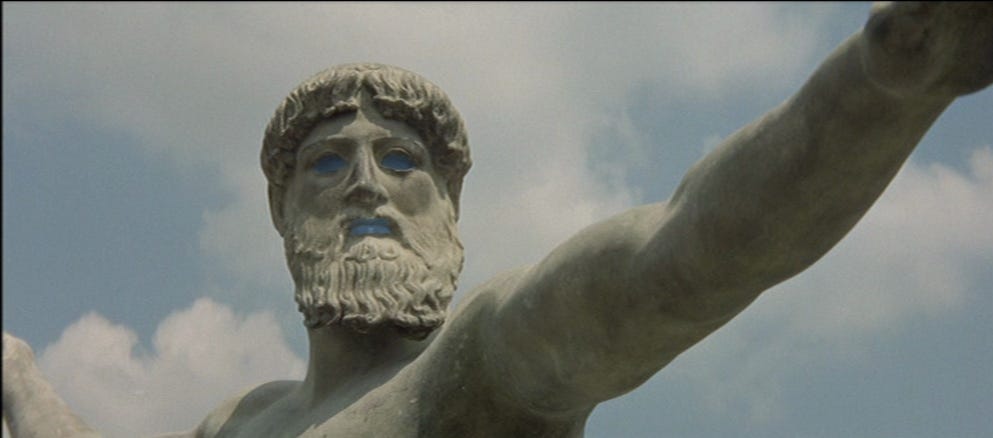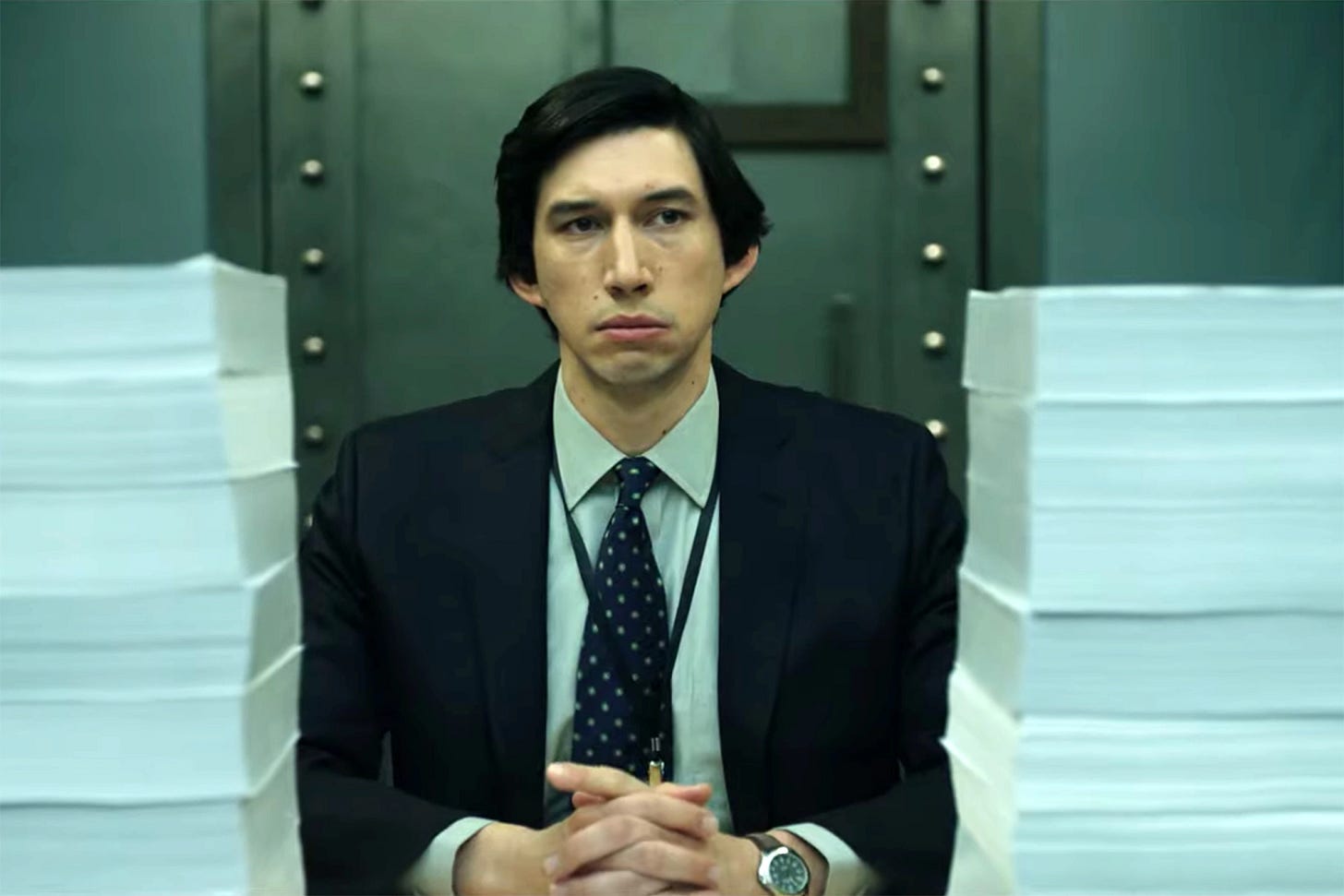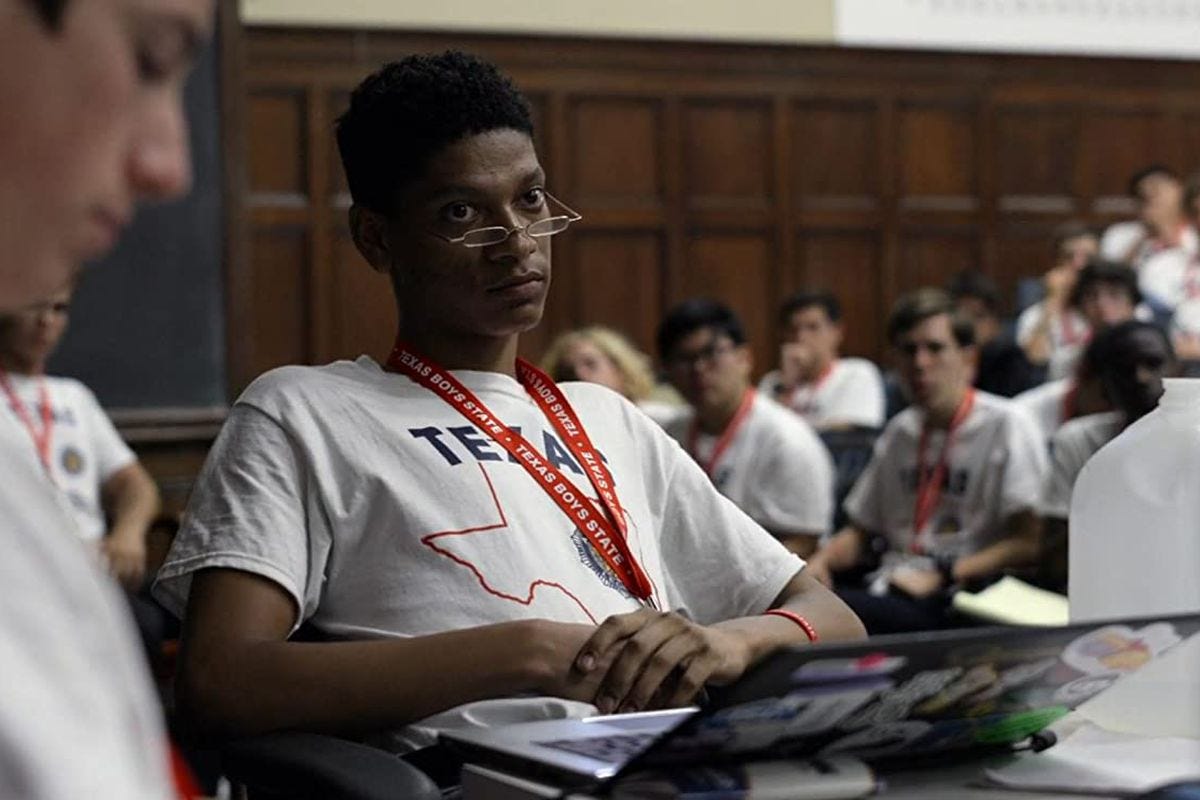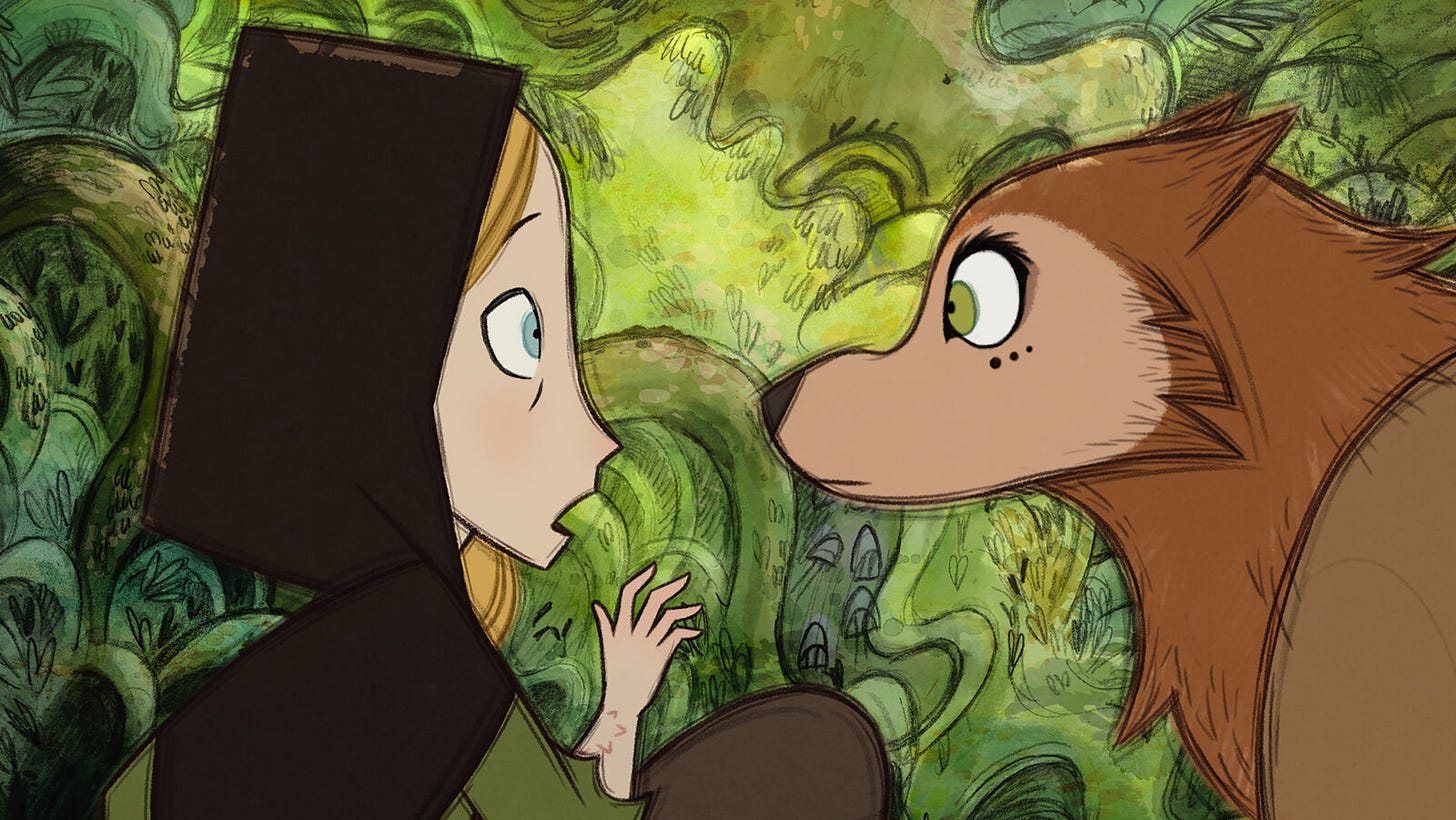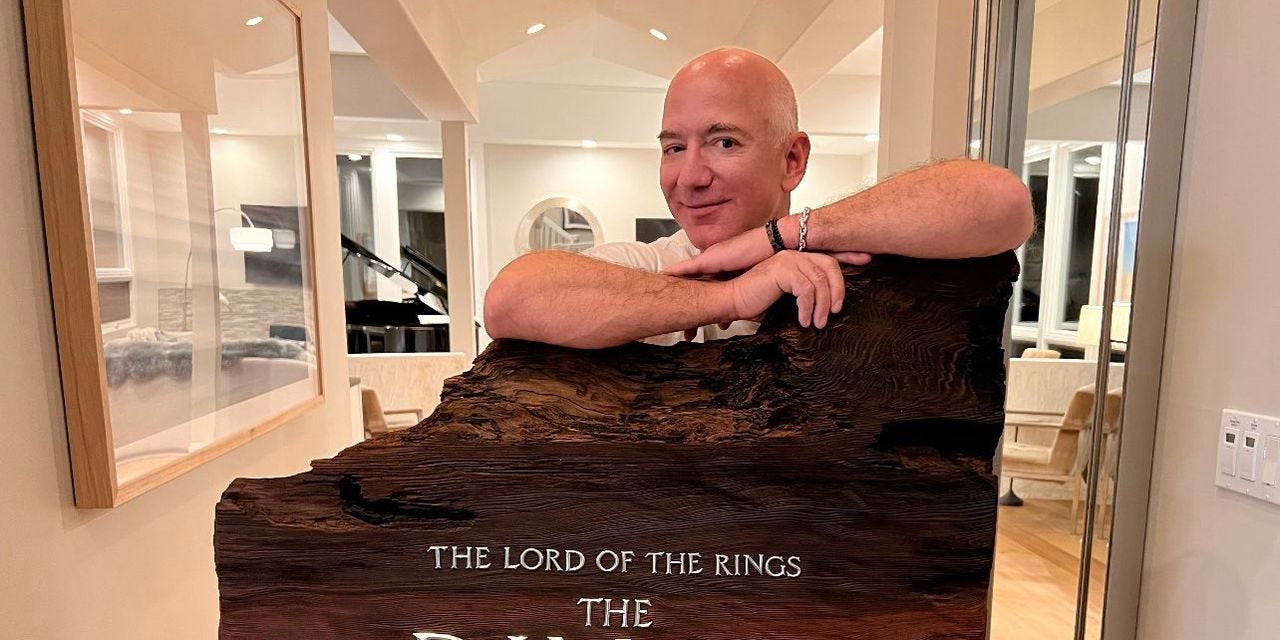RIP Jean-Luc Godard, CineGOAT et Mon Amour, Weekly Reel #32
I recommend my favorite Godard film, Le Mépris, then discuss a CIA torture film, a documentary about young Texas conservatives, and an animated feature from Ireland.
News of the Week: Jean-Luc Godard died at his Swiss home on Tuesday via assisted suicide.
Watch Now
Contempt (Le Mépris, 1963, Jean-Luc Godard, France/Italy) was Godard’s sixth film in three years. It’s based on an Italian novel about a French playwright, Paul (Michel Piccoli), who decides whether to rewrite a script based on Homer’s Odyssey, which a German filmmaker, Fritz Lang (playing himself) is directing. Jeremy Prokosch (Jack Palance), who’s as cock-sure as any Roman emperor, is the American producer for the Italian-French-German co-production, who uses a translator, Francesca (Giorgia Moll), to switch between the four languages. Paul reluctantly takes the job hoping it will provide enough funds to complete his Roman apartment where he lives with his beautiful wife Camille (Brigitte Bardot). It opens at Cinecittà Studios, a legendary production studio in Rome, where Prokosch convinces Paul to take the job after showing him dailies. Prokosch then invites the group to his villa right as Camille arrives. He offers Camille the only other seat in his Alfa Romeo 2600 Spider, but she senses Prokosch using her in his power game with Paul over accepting the lucrative job. She asks Paul if she should go with him, strongly hinting that she doesn’t want to. He says that it isn’t a problem, go ahead. She’s dismayed. And in this moment, the catalyst that leads to the breakdown of their marriage is born.
Although Contempt is Godard’s most “conventional” film, it’s also his most personal. Richard Brody, film critic for the New Yorker who wrote an amazing biography on Godard called Everything is Cinema, argues that the film was a million dollar letter to Anna Karina, his wife at the time. First some back-history.
Godard cast Karina for his second film—she declined the lead female part in Breathless, his first film, but refused because it revealed nudity. But as any young Frenchman would, he relentlessly pursued her and convinced her for the next one. She was only eighteen—he was twenty-eight—and had only acted in commercials. She was from Denmark, so her French wasn’t that great. On the set of their first film, they fell in love and were married within the calendar year. Then they made two other films in eighteen months; but in that time, she had a late-term miscarriage and their relationship seriously fractured, which was evident in their grim third film. On the surface and in the press, he was the hot young French director, and she was the darling starlet. For Contempt he worked with a much larger budget than usual—one million USD—because of backing from American co-producers as well as the use of wide-screen technicolor. This, Godard thought, was the closest he would get to shooting a film like his favorite Hollywood directors like Howard Hawkes and Billy Wilder; filmmakers he had spent a decade in film criticism defending and elevating to their present-day position as artists.
But temperamental passions plagues the production of Contempt, much of it coming from Godard running a larger than usual production, and from Bardot, who took half the total production budget and was demanding. (They’re French.) The biggest problem was Godard making a 1:1 equivalent between Contempt’s story and his relationship with Karina. Like Paul, Godard took on this lavish production to make enough money to support his marriage’s urban lifestyle. But that wasn’t exactly the problem. The two, both pairs, were simply different. She was instinctual and he was reasonable—I’m sure you who are reading this can relate. Because Godard made the film so personal—he had the actor playing Paul wear his clothing and complained to Bardot that she wasn’t walking like Karina—one can feel the reality of their marriage breaking apart. At every turn, at every question and response between Paul and Camille, they slip away further. With each re-watch, I’m still hoping Paul responds differently. The film subconsciously forces the viewer to respond using their own life. Therefore, hoping that Paul responds differently is my own wish that I had said or acted differently in a past relationship. That doing so would have kept us together.
And since this is Godard, the shooting location itself, Cinecittà Studios, as well as cinema in general by the early nineteen-sixties, was in disrepair; the buildings resemble the statues of cinematic gods from another era. And that’s also related to the Odyssey and the ancient Greek and Roman statues used as cutaways, more images of the ancient gods from another era. In many ways, Contempt repeats itself through the unifying concept of things falling apart, no matter how small: whether that’s the collapse of ancient Rome, the end of the golden age of Hollywood’s studio system, or the dissolution of a marriage.
This is why we celebrate Godard today and why his cinematic legacy will forever stand amongst the statues of great filmmakers. His filmmaking career spanned seven decades, beginning in 1955 and ending in 2018, which is over half of cinema’s existence. I’ll always remember the moment I binged his films, which inspired and sparked within me an artistic revelation that no other filmmaker came close to. Although I named this blog after Kubrick and Nolan, its Godard’s creative, artistic freedom guiding how I view and write about film. Here’s a short interview of Godard around the time of Contempt that shows off his joie de vivre:
Save for Later
The Report (2019, Scott Z. Burns, USA) is the rebuttal to Zero Dark Thirty by answering the important questions: how were they allowed to commit international war crimes? Who let them? How long were they doing this? What essential functions, if any, did this have? Were they telling us everything? Why weren’t we better informed? These are all erased by that final act raid sequence that bleaches the first two acts via Michael Bayisms. The Report tells the story of Senate aid Daniel Jones (Adam Driver), who investigates the CIA’s use of torture post-9/11 and drafts a report on his findings. In short, he found that the CIA had authorized, without approval from the U.S. President, the use of torture based on fake science and used those techniques repeatedly—and about a quarter of the time on prisoners falsely arrested—on foreigners held without trial, in unknown countries, which didn’t produce any tangible results that stopped future terrorist activities or gather the intel that led to the illegal killing of bin Laden. The film is in the style of a political thriller à la All the President’s Men, where Jones does his best to stand by the facts while trying to expose the most well-funded, secret—Americans aren’t allowed to know how much they spend each year on the CIA—military organization on the planet.
The Report affects the viewer with plot revelation more than thrills, which filmmakers rely on for the lesser political thrillers but works quite well here. I think that’s because there’s so much intrigue and unanswered questions around this topic. Everything about Zero Dark Thirty—especially knowing what we do in 2022—is fishy. By filling in those missing holes, it takes away from the thriller genre tropes that made others in the political sub-genre classics. In other words, The Report works well right now, but what about after we’ve forgotten about the scandal? It made a small splash at Sundance in 2019 and then quickly shelved at Amazon Studios, so the theatrical exposure didn’t allow it to shine—it didn’t help that Amazon delayed the release twice until it landed on the same weekend as Ford v. Ferrari, Charlie’s Angels, and The Irishman, and in only several dozen theaters. Therefore, you can find The Report hiding in its eternal spot on Prime Video.
Boys State (2020, Jesse Moss and Amanda McBaine, USA) is a documentary about the 2018 Boys State in Austin, Texas, which is an event that puts over a thousand teen boys together—there’s also a Girls State—for a week and teaches them the practical steps to running for State office positions and building party platforms. It follows four of the boys, three of which win important office positions. Although it’s hard to determine how many more there are, two of the boys featured are liberals disguising themselves as moderate centrists to achieve political gain. The boys are split in two groups, Nationalists and Federalists—having nothing to do with their historico-political namesakes—and by the end of the week have an important gubernatorial election to see how effective their campaigns and platforms reach cross-partisan political machinations.
I won’t give away who won in the end and how, but it’s what one would expect from a group of seventeen-year-olds, ninety-five percent of whom are solidly conservative. And the few liberals who are there must swerve to the right to gain support. In confession shots, the liberals talk about how their perceptions of conservatives were much worse before they went there, going as far as to say they support many socially liberal goals. I smell bullshit. They were solidly pro-life and didn’t talk about social issues—unless the generic call for “freedom” counts. The only policy position carved out in the major races was gun freedom it seemed. Although the group was incredibly homogenous politically and ethnically, more Texan than American, it still reveals a reference to the USA’s political cloud since Carter: liberals moving to the right to appease conservatives, conservatives moving further to the right to get the lizard votes, and then the dumping of socially liberal issues, including the rights of working people, whether liberals are involved or not. The program itself is sus; the boys find out how to make up campaign platforms and tactics without having to implement those policies or care about them. Also, where were the super PACs? Are we to believe that they have no say in important political races? Nonetheless, the doc is enjoyable and available on Apple TV+.
Wolfwalkers (2020, Tomm Moore and Ross Stewart, Ireland/Luxembourg/France) is an animated film that takes the premise of Avatar and Brave and turns it into a good film. It’s about Robyn Goodfellowe (Honor Kneafsey), a young English girl living with her father (voiced by Sean Bean) in the small Irish hamlet of Kilkenny in 1650. Her father is a wolf-hunter while Robyn stays home fantasizing about woodland adventures. The town is under the strict orders of the Lord Protector, an Oliver Cromwell stand-in, who keeps a close eye on the Goodfellowes. The wolves are under the control of Wolfwalkers, who can transform their souls into physical wolves while their body is sleeping at night. One day when Robyn sneaks out on an adventure, she comes across a Wolfwalker, who accidentally bites Robyn while trying to free her from a trap. In the mythology of this world, these bites are vampiric spreaders that fulfills a longing in Robyn to become free from the city but sets in motion events that will transform both the city’s relationship with the frontier and Robyn’s relationship with her wolf-hunting father.
Cartoon Saloon, the animation studio behind Wolfwalker, is a powerful young studio that is accomplishing feats exceeding their Kilkenny roots. Their films—Wolfwalker is number four—don’t make Pixar-level box office grosses, but each film reaches Pixar-level critical reception. And like Pixar and Studio Ghibli—and unlike Illumination and other studios that outsource their work for cheap animation—Cartoon Saloon takes pride in their work, which shows. Wolfwalker has a distinctly beautiful 2-D style that matches their style to form to enhance the story and show the creativity and limitless ambitions of artists—a rare concept nowadays! Even though the folkloric story is as fresh as Kraft “Parmesan” cheese, the way it’s told makes one forget that it should be a refrigerated product. The final act is an amazing Ghibliesque thrill-ride. It’s one of the few animated films that doesn’t need to be explained away as “oh, this is supposed to be for children.” I’m looking forward to the studio’s upcoming release in October. In the meantime, Wolfwalkers is sitting at Apple TV+, which bought it after its TIFF premiere in 2020.
Pass
It isn’t a film, but I would stay away from The Lord of the Rings: The Rings of Power, which has the stink of an Amazon/Bezos cash-grab all over it.
Thank you once again for checking out my Substack. Hit the like button and use the share button to share this across social media. And don’t forget to subscribe if you haven’t already done so.





